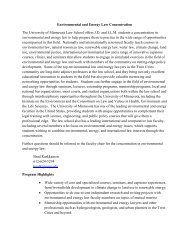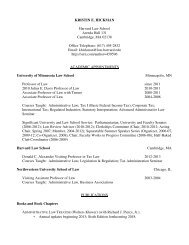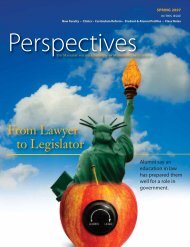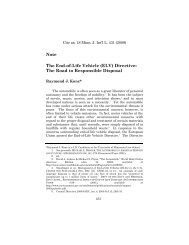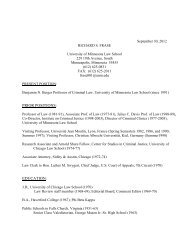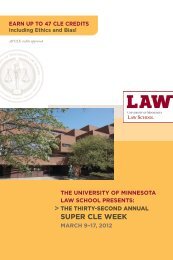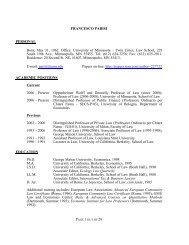Enabling Private Ordering - the University of Minnesota Law School
Enabling Private Ordering - the University of Minnesota Law School
Enabling Private Ordering - the University of Minnesota Law School
Create successful ePaper yourself
Turn your PDF publications into a flip-book with our unique Google optimized e-Paper software.
2009] UMBRELLA CLAUSES 19<br />
have entered into a contract for <strong>the</strong> construction <strong>of</strong> a power<br />
plant in <strong>the</strong> host country and its subsequent operation by <strong>the</strong><br />
investor for thirty years. Under <strong>the</strong> contract, <strong>the</strong> investor is<br />
required to build <strong>the</strong> plant within a certain period, to operate it,<br />
and to supply electricity. The host State, in turn, grants <strong>the</strong><br />
investor a thirty-year concession for <strong>the</strong> operation <strong>of</strong> <strong>the</strong> plant<br />
and gives guarantees for <strong>the</strong> investor’s tariff calculation. Based<br />
on <strong>the</strong>ir mutual expectation, <strong>the</strong> contract aims at realizing gains<br />
from cooperation: <strong>the</strong> investor intends to make pr<strong>of</strong>its by selling<br />
energy; <strong>the</strong> host State expects to be supplied with energy and<br />
benefit from <strong>the</strong> investor’s know-how in constructing and<br />
operating <strong>the</strong> plant. Yet, <strong>the</strong> investor’s investment decision is<br />
based on <strong>the</strong> expectation to earn future cash returns from <strong>the</strong><br />
operation <strong>of</strong> <strong>the</strong> plant and presupposes that <strong>the</strong> host State will,<br />
inter alia, comply with its original promises not to interfere with<br />
<strong>the</strong> tariff regime.<br />
In economic terms, <strong>the</strong> situation <strong>of</strong> <strong>the</strong> foreign investor is<br />
characterized by <strong>the</strong> asset or transaction specificity <strong>of</strong> <strong>the</strong><br />
investment. Once its obligations to construct <strong>the</strong> plant have<br />
been fulfilled, <strong>the</strong> investor cannot simply sell <strong>the</strong> plant or <strong>the</strong><br />
energy to third parties or relocate <strong>the</strong> plant if <strong>the</strong> host State<br />
does not comply with its obligations, for example by unilaterally<br />
changing <strong>the</strong> investment contract, imposing additional<br />
obligations on <strong>the</strong> investor, or even completely withdrawing<br />
from its original promises in order to extract a greater benefit<br />
from <strong>the</strong> bargain. Unlike in situations <strong>of</strong> self-enforcing<br />
contracts, where “<strong>the</strong> threat by ei<strong>the</strong>r party no longer to deal<br />
with <strong>the</strong> o<strong>the</strong>r is sufficient in and <strong>of</strong> itself to induce<br />
performance,” 37 investor-State contracts typically involve a risk<br />
that <strong>the</strong> host State will not abide by its original promise, but try<br />
to “renegotiate” <strong>the</strong> original bargain or even openly breach it.<br />
The typical situation in investor-State relations is thus prone to<br />
be affected by opportunistic behavior <strong>of</strong> <strong>the</strong> host State with nonrecoverable,<br />
sunk costs as a consequence. Certainly, <strong>the</strong> reverse<br />
situation <strong>of</strong> foreign investors behaving opportunistically and<br />
attempting to renege on <strong>the</strong>ir original promises also exists.<br />
However, <strong>the</strong> host State as a sovereign actor is typically able to<br />
react to such conduct by unilaterally imposing sanctions upon<br />
<strong>the</strong> investor and enforcing <strong>the</strong>m against <strong>the</strong> assets <strong>of</strong> <strong>the</strong><br />
investment project. 38 The fact that <strong>the</strong> host State disposes <strong>of</strong> <strong>the</strong><br />
37. Schwartz & Scott, supra note 35, at 557 (emphasis in <strong>the</strong> original).<br />
38. There are exceptional situations where this mechanism does not work<br />
effectively, for example, because <strong>the</strong> investor does not have any or sufficient assets



